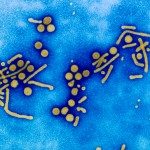Lien vers Pubmed [PMID] – 3139406
EMBO J. 1988 Jun;7(6):1689-96
A clone of Daudi cells (Daudi-S) synthesizes the heavy chain of IgM (mu-chain) under routine conditions of cell culture. In the presence of alpha-interferon, however, synthesis of mu-chain is decreased rapidly at a time when the overall protein synthesis is not modified and the dsRNA-dependent protein kinase and the 2-5A synthetase are induced. This inhibition of mu-chain synthesis seems to be correlated with the antiproliferative action of interferon since it occurs only slightly in another clone of Daudi cells resistant (Daudi-R) to the antiproliferative action of interferon. In these resistant cells, however, the protein kinase and the 2-5A synthetase are induced by interferon. Specific inhibition of mu-chain synthesis in interferon-treated Daudi-S cells is a consequence of decreased steady-state levels of mu-chain mRNA. This effect occurs 4-8 h after addition of interferon in parallel with decreased levels of c-myc mRNA and enhanced levels of HLA mRNA. Reduced levels of mu-chain mRNA in interferon-treated Daudi-S cells is not a consequence of its enhanced degradation as shown by actinomycin D chase experiments. Furthermore, nuclear run on experiments rule out an effect on the transcription of mu-chain mRNA. Therefore, the inhibitory mechanism mediated by interferon might be at the level of termination and/or post-transcriptional processing of mu-chain RNA. In contrast, in these same interferon-treated Daudi-S cells, the inhibition of c-myc gene expression is due to an enhanced degradation of its mRNA (in accord with other reports). These data indicate that interferon can inhibit gene expression by different mechanisms.
